In 1946,
Motion Picture Daily voted her “Radio’s Queen of Comedy” for the fourth year in a row.
Who was it?
It wasn’t Gracie Allen. It wasn’t Penny Singleton (Blondie). It wasn’t even Barbara Jo Allen (Vega Vague).
It was none other than Joan Davis.

Today, if she’s remembered at all, it’s—ironically—for a television series called
I Remember Joan. The “I” in this case was Jim Backus. By that time, Backus’ TV-squeeze had been de-crowned as Queen of Comedy by the main squeeze of another titular “I.” This “I” in this case was Desi Arnaz. I think you know who we’re talking about.
The start of the 1946-47 radio season didn’t go all that well for Davis, if reports in
Variety are any indication. First, CBS boss Bill Paley rejected a storyline involving an amnesiac Davis only remembering serial numbers from “lucky bucks” (a contest gimmick involving real dollar bills in circulation). Agency Young and Rubicam moaned seven scripts would have to be tossed out.
Then sponsor Lever Brothers felt Davis was costing too much, which may be the reason announcer Harry Von Zell was replaced over the summer with Frank Bingman, competent, but a big step-down from a comic actor like Von Zell (vocalist Andy Russell also left Swantown, the setting for the Swan Soap programme). And a blurb in the trade paper reported in October “Some guy with a cackly laugh parked right under the audience pickup mike at KNX and almost ruined Joan Davis' Coast repeat. He got more and longer laughs than the mike-siders.”
That guy (perhaps it was Eddie Cantor) may have loved Davis, but she has never really done anything for me. Her show has the familiar one-note characters heard elsewhere on radio. Still,
Variety liked her season opener. Even cynical critic John Crosby had good things to say about her, but not so much the ridiculously contrived plots of her show, or the unceasingly repetitious commercials. (Some papers in the syndicate did not mention the soap's name; free advertising, you know).
Here’s Crosby’s column from the Herald Tribune syndicate, Nov. 27, 1946.
RADIO IN REVIEW
By John Crosby
The Plot Thickens
The rules and regulations for female radio comics are now fairly well established and more or less undeviating. The radio comedienne must be brassy voiced, energetic, full of unpredictable enthusiasms and mildly sex-starved, though not enough to get into difficulties with the censors. Joan Davis (CBS 8:30 p. m. Mondays) does not violate these precepts to any great extent but is possibly a little better at it than her contemporaries.
The Joan Davis show is situation and, in a sketchy way, character comedy of a sort that will remind you strongly of Mack Sennett. Most of the characters might have walked right out of the Sennett comedies. Also, there are a lot of policemen around and Miss Davis usually gets mixed up with them. Surrounding Miss Davis, whose outlines you must recognize, are her Cousin Cornelia [played by Verna Felton], an irascible, dictatorial lady who thinks Joan is a nincompoop and says so; Cousin Selenus (I think that's how it's spelled), who is a nincompoop; a rich girl called Barbara Willoughby, who is a sort of female Hubert Updike 3rd; a man who never finishes a sentence; and Wally, Joan's boy friend.
 I mention all these people because I'd like to make a synopsis of a Joan Davis plot, all of which are as thick as molasses and almost as wildly improbable as some of Shakespeare's comedies. On a recent program, for instance, Miss Davis, who runs a restaurant on this show, gets into an argument with Cousin Cornelia and later blurts out something about an accusation that “cut Cousin Cornelia like a knife.” Somehow this is construed as meaning she has cut Cousin Cornelia with a knife. Just about this time, Cousin Cornelia goes back to mother or anyway goes someplace else. Then—now follow along closely here—Miss Davis buries some old bones from her restaurant kitchen in her backyard. Well, sir, just about this time Wally decides to go fishing and while digging for worms, he comes upon the bones.
I mention all these people because I'd like to make a synopsis of a Joan Davis plot, all of which are as thick as molasses and almost as wildly improbable as some of Shakespeare's comedies. On a recent program, for instance, Miss Davis, who runs a restaurant on this show, gets into an argument with Cousin Cornelia and later blurts out something about an accusation that “cut Cousin Cornelia like a knife.” Somehow this is construed as meaning she has cut Cousin Cornelia with a knife. Just about this time, Cousin Cornelia goes back to mother or anyway goes someplace else. Then—now follow along closely here—Miss Davis buries some old bones from her restaurant kitchen in her backyard. Well, sir, just about this time Wally decides to go fishing and while digging for worms, he comes upon the bones.
Now pay attention, it starts to get complicated here. Miss Davis has been having some sort of mental disorder and has called in a psychiatrist, who diagnoses it as Cousin Cornelia trouble. He teaches her to say, "Cousin Cornelia is no more,” as mental therapy. Then Wally (are you still listening?) comes in and hears this curious sentence and you can imagine the reaction of a man who has just dug up all those bones. Murder!
Stick around, this is just beginning. A casual acquaintance drops in and leaves his gorilla skull with Joan. (I don’t know where he got it either; just something kicking around the house.) Well, Joan puts it in the hall closet where she keeps all her skulls and there Wally comes on it. “Yow!” he howls, “Cousin Cornelia! I’d recognize that face anywhere."
So he buries the skull to protect his beloved, but a dog digs it up and then Miss Willoughby, a snob about homicide, calls the police. Miss Davis is charged with murder but Cousin Cornelia shows up in the nick of time to fix everything until next week, same time, same station. As you'll notice, there is almost as much plot as “Gone With the Wind,” all in half an hour. Another plot in my Joan Davis collection revolved around a Cadillac she won in a limerick contest. The license plates were inadvertently placed upside down which made it a hot car. Again she landed in the hoosegow, and that's enough about plots for now.
* * *
Miss Davis performs these shenanigans with humor and a certain amount of style. She is a sort of female Bert Lahr without that great man's zest for the ridiculous. Her special knack is vast and startling range of emotions. She can jump from rage to tears to glee all in one sentence. If the material us a little ridiculous, the blame is not entirely hers.
Incidentally, Miss Davis is sponsored by Swan Soap, which is one of the marvels of the age. This soap has so many virtues that one announcer can't handle all of them. He is assisted by a Greek chorus of housewives. It goes something like this:
ANNOUNCER: There is a difference between an ordinary fiddle and a fine handmade violin. Yes, there is a difference in soaps, too. As one housewife says . . .
FIRST HOUSEWIFE: Swan is an utterly different soap.
ANNOUNCER: Yes, Swan is an utterly different soap.
SECOND HOUSEWIFE: My face feels so fresh, so bright, so young after using Swan.
THIRD HOUSEWIFE: My face feels so different when I use Swan.
FOURTH HOUSEWIFE: I can always be sure of this—Swan agrees with my skin.
FIRST HOUSEWIFE: Swan is an utterly different soap.
ANNOUNCER: Yes, friends, Swan is an utterly different soap. No other soap can give you all these advantages. Yes, it rinses away so thoroughly. And it lasts longer, too, because it doesn't leave excess soap dish goo.
Yes, friends, Swan has everything, or almost everything. The only claim they don't make is that it’ll get the dirt off.
As for Crosby’s columns during the rest of the week, Tuesday the 26th looked at a Mutual show called “Broadway Looks Back.” Another Mutual programme grabbed his attention on Friday the 29th. Newsman Gabriel Heatter’s claim to fame is the phrase “Ah! There’s good news tonight.” Mutual seems to have spun that into a feature news programme with Heatter dispensing happy or touching stories. On Thursday, the 28th, Crosby relates an unusual broadcast about a humanised sound effect on a dramatic anthology series on ABC’s “World Security Workshop.” Ray Bradbury was one of the writers. You can
listen to one episode here and learn more about this interesting series.
Kathy Fuller-Seeley suggested to me a few years ago it would be nice if Crosby's early columns were available someplace. We have transcribed or screen-shot them from the
New York Herald Tribune on this blog from Day 1 to November 30, 1946, with the exception of sound effect column below, which comes from an Ottawa newspaper as the
Herald Tribune for that date is missing pages on-line. They are on the John Crosby link to the right. And you can click on the three below to read them.

























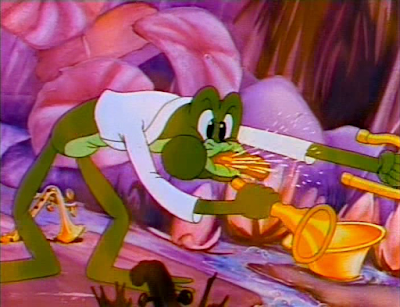




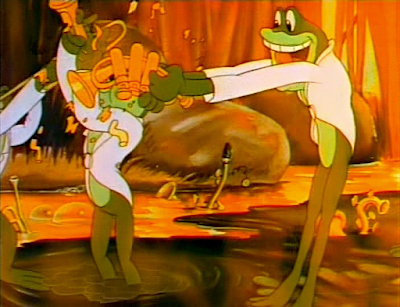
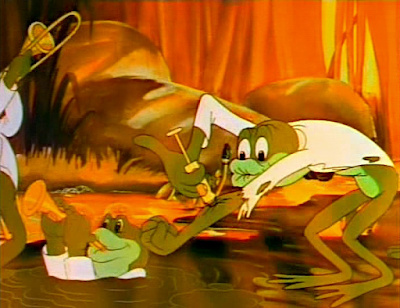

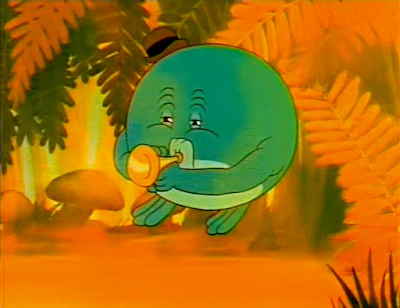

 Today, if she’s remembered at all, it’s—ironically—for a television series called I Remember Joan. The “I” in this case was Jim Backus. By that time, Backus’ TV-squeeze had been de-crowned as Queen of Comedy by the main squeeze of another titular “I.” This “I” in this case was Desi Arnaz. I think you know who we’re talking about.
Today, if she’s remembered at all, it’s—ironically—for a television series called I Remember Joan. The “I” in this case was Jim Backus. By that time, Backus’ TV-squeeze had been de-crowned as Queen of Comedy by the main squeeze of another titular “I.” This “I” in this case was Desi Arnaz. I think you know who we’re talking about.
 I mention all these people because I'd like to make a synopsis of a Joan Davis plot, all of which are as thick as molasses and almost as wildly improbable as some of Shakespeare's comedies. On a recent program, for instance, Miss Davis, who runs a restaurant on this show, gets into an argument with Cousin Cornelia and later blurts out something about an accusation that “cut Cousin Cornelia like a knife.” Somehow this is construed as meaning she has cut Cousin Cornelia with a knife. Just about this time, Cousin Cornelia goes back to mother or anyway goes someplace else. Then—now follow along closely here—Miss Davis buries some old bones from her restaurant kitchen in her backyard. Well, sir, just about this time Wally decides to go fishing and while digging for worms, he comes upon the bones.
I mention all these people because I'd like to make a synopsis of a Joan Davis plot, all of which are as thick as molasses and almost as wildly improbable as some of Shakespeare's comedies. On a recent program, for instance, Miss Davis, who runs a restaurant on this show, gets into an argument with Cousin Cornelia and later blurts out something about an accusation that “cut Cousin Cornelia like a knife.” Somehow this is construed as meaning she has cut Cousin Cornelia with a knife. Just about this time, Cousin Cornelia goes back to mother or anyway goes someplace else. Then—now follow along closely here—Miss Davis buries some old bones from her restaurant kitchen in her backyard. Well, sir, just about this time Wally decides to go fishing and while digging for worms, he comes upon the bones.


















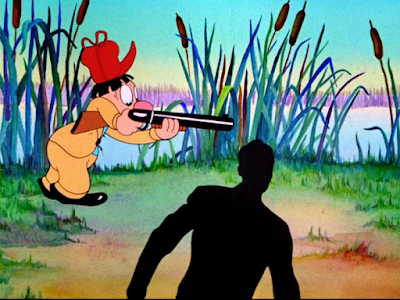
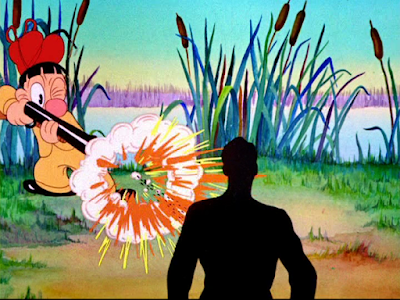
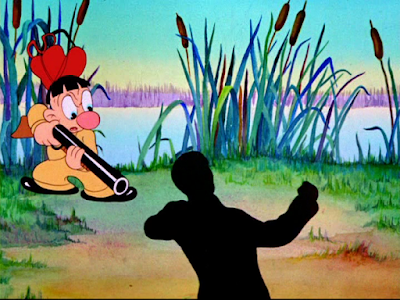 >
>




